Special Focusing
Situations in Autofocus Autofocus operation depends on general lighting, subject
contrast and detail, and other technical factors. In rare situations where autofocus
(and manual focus with Electronic Rangefinder is not possible, ![]() blinks telling you to focus manually
with the clear matte field or perform autofocus on another subject located at the
same distance.
blinks telling you to focus manually
with the clear matte field or perform autofocus on another subject located at the
same distance.
 |
 |
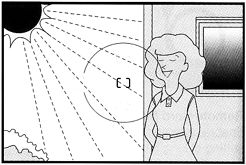 |
B. Low-contrast subject Focus manually with clear matte field, or for Single Servo AF, focus on another subject at the same distance but with more contrast, then lock focus and recompose.
C. Strongly backlit subject, bright subject with shiny surface such as silver or aluminum, or scene in which there is a pronounced difference in brightness. Use Single Area AF mode and select subject's focus area (page 38) or focus manually with clear matte field.
In the following situations, ignore in-focus indicator
• Subject obscured by an object, such as a fence, in the foreground Use Single Area AF mode and select subject's focus area or focus manually with clear matte field.
• With an extremely bright object near your subject Use Single Area AF mode and select subject's focus area or focus manually with clear matte field.
• When using a linear polarizing fill or other special filter such as a soft-focus filter. Focus manually with clear matte field.
• Circular polarizing Filter can be used in connection with autofocus operation.
Trouble Shooting the Nikon F5
|
LCD panel |
viewfinder |
shutter |
cause & remedy |
|
No indication |
No indication |
Locked |
Batteries are completely exhausted or improperly installed, Rotate power switch to OFF and replace batteries. |
|
|
- |
can be accessed |
Batteries are nearing exhaustion. Have a fresh set ready. |
|
|
- |
Locked |
Batteries are just about exhausted. Rotate power switch to OFF and replace batteries with a fresh set. |
|
|
Locked |
Film is incorrectly positioned. Reload film. |
|
|
|
|
Locked |
non-DX-coded film or film with unacceptable DX code is loaded, Set manually to correct film speed |
|
|
Locked |
Film has reached end of roll. Rewind film |
|
|
|
|
can be accessed |
Programmed Auto or Shutter-Priority Auto exposure mode, lens is not set to the smallest aperture setting. Set lens to the smallest aperture. |
|
LCD panel |
viewfinder |
shutter |
cause & remedy |
|
|
|
can be accessed |
With built-in CPU lens in Aperture-Priority Auto or Manual exposure mode, lens is NOT set to the smallest aperture setting. To set aperture with the Sub-Command Dial, set lens to the smallest aperture. Aperture can also be set by rotating the lens aperture ring, In this case, |
|
|
Locked |
F5 has detected abnormality in the shutter diaphragm. Turn camera power off once and on again. If the same warnings continue to blink, take camera to an authorized Nikon dealer or service center. |
|
|
- |
|
can be accessed |
3D Color Manx Metering is set even though attached lens has no CPU; camera automatically resets meter to Center-Weighted Metering. |
|
P or S blinks |
A appears |
can be accessed |
Programmed Auto or Shutter-Priority Auto exposure mode is set even though attached lens has no CPU. Camera automatically resets exposure mode to Aperture-Priority Auto. |
|
- |
|
Locked |
Autofocus (and manual focus with Electronic Rangefinder) is not possible. Focus manually. |
|
Hi appears |
Hi appears |
can be accessed |
Overexposure possible |
|
Lo appears |
Lo appears |
can be accessed |
Underexposure possible |
** Non-CPU lens is attached. Programmed Auto or Shutter-Priority Auto exposure mode cannot be selected, Set aperture by rotating lens aperture ring. In this case, aperture can only be confirmed through the aperture direct-readout in viewfinder.
|
LCD panel |
viewfinder |
shutter |
cause & remedy |
|
Selected shutter blinks |
|
can be accessed |
In Shutter-Priority Auto or Manual exposure mode, selected shutter speed is faster than 1/250 or selected flash sync speed in Custom Setting. |
|
- |
|
can be accessed |
Flash fired at its full output and light might have been insufficient. Re-adjust focusing distance, aperture, flash shooting distance range, etc. and shoot again. |
|
|
|
can be accessed |
Auto Exposure/Flash Exposure Bracketing is selected. |
|
|
|
Locked |
|
|
|
- |
can be accessed |
Shooting data is full in F5's memory. Download data to your personal computer using the optional Personal Computer Connecting Cord MC-33 or MC-34 and the Photo Secretary for F5. If you continue shooting, the oldest data will be erased one roll at a time. With Photo Secretary for F5, shutter can be set to lock when memory is full |
|
Alert LED blinks |
Locked |
|
|
Camera Care & Guidelines on Handling
1. Do not touch the camera's reflex mirror or focusing screen. Remove dust with a blower brush.
2. Do not touch the shutter curtains.
3. Do not touch the DX contacts. Keep them clean with a blower brush.
4. Clean the viewfinder eyepiece with a soft, clean cloth. Do not use alcohol.
5. Clean lens surface with a blower brush. To remove dirt and smudges, use a soft, clean cotton cloth or lens tissue. Wet with ethanol (alcohol) or lens cleaner. Wipe in a circular motion from center to outer edge, taking care not to leave traces and not to touch the other lens parts.
 |
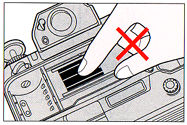 |
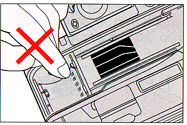 |
 |
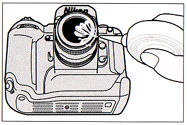 |
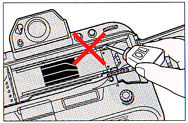 |
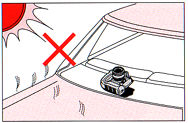 |
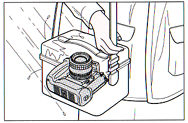 |
Caution: A spray gun-type blower may damage the optical glass if used to clean the lens, especially if ED glass is used for the front lens element. To avoid damage, hold the blower upright with its nozzle more than 30cm (approx. 12 inches) from the lens surface, and keep the nozzle moving so the stream of air is not concentrated in one spot.
6. Do not lubricate the camera.
7. Do not leave the camera in an excessively hot place.
8. Keep the camera away from water or moisture. When using the camera near water, guard against splashes, especially saltwater spray.
9. Make sure not to drop or bump the camera body/lens against a hard surface. Strong shock may cause malfunction.
10. If the camera malfunctions, take It immediately to an authorized Nikon dealer or service center.
11. Store the camera in a cool, dry place away from naphthalene or camphor (moth repellent). In a humid environment, store the camera inside a vinyl bag with a desiccant to keep out dust, moisture and salt. Note, however, that storing leather cases in vinyl bags may cause the leather to deteriorate.
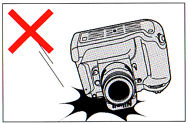 |
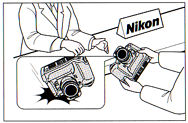 |
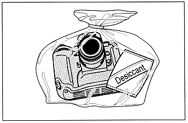 |
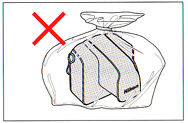 |
Note: In certain cases, due to static electricity or poorly loaded batteries, the F5's microcomputer may turn the camera off. For the same reason, film may not advance properly. In each of these cases, to resume operation, simply turn the power off, then on again, or remove batteries and install them again.
NOTES
ON BATTERIES
1. Keep batteries out of children's reach. If someone accidentally swallows a battery,
call a doctor immediately.
2. Do not disassemble, short circuit or heat batteries. Do not charge dry cells.
3. If you do not intend to use the camera for a long time, remove the batteries.
4. Battery power diminishes at extremely low temperatures - make sure the batteries
you buy are new, and wrap the camera body in something warm.
5. When replacing batteries, be sure to replace all batteries at the same time. Always
use fresh batteries of the same brand.
6. Do not throw used batteries into a fire.
7. If the battery chamber is contaminated by battery leakage, take the camera to
an authorized Nikon dealer.
| previous | NEXT | 17/18 Glossary
of Photographic Terms with the Nikon F5
| Back to Index Page |
Instruction Manual for Nikon F5
|
Back | Main Index Page - Nikon F5
Professional SLR camera
The Camera - Background,
Issues & Summary
Basic
Features | Focusing | Metering Systems | Exposure Control | Reliability Issues | Nikkor lens Compatibility
Prisms/Finders - Index page
- 2 parts
Film Backs: Index
Page - 1 parts
Focusing Screens - Index
Page - 1 part
Flash System - Index
Page
- 3 parts
System Accessories: | Power Sources | Cases | Remote
Control | Miscellaneous
Macro
Photography
- Related info on Micro-Nikkor lenses
Technical Specification for Nikon F5
Main
Reference Map
/ Nomenclature
Resource Centre:
Instruction Manuals
Nikon
F5 Camera Body
- 18
parts
MF-28
Multi-Function Back
HTML - 8
parts
PC
Links - Photo Secretary
- 2
parts
AF-TTL Speedlights:
SB-28 / SB28DX | SB29(s) info | SB30 | SB50DX | SB80DX | SB600 info | SB800
Variants: F5 50th Anniversary Model | Nikon/Kodak DCS-620 | DCS-720 Digital Still SLR camera
| Nikon F | Nikon F2 | Nikon F3 | Nikon F4 | Nikon F5 | Nikon F6 | Nikkormat / Nikomat | Nikon FM | Nikon FE/ FA | Nikon EM/FG/FG20 | Nikon Digital SLRs | Nikon - Other models |
The Eyes of Nikon:-
Nikon Auto Focus Nikkor lenses:- Main
Index Page
Nikon Manual Focus Nikkor lenses:- Fisheye-Nikkor Lenses - Circular | Full Frame |
Ultrawides Lenses - 13mm15mm18mm20mm | Wideangle Lenses - 24mm28mm35mm | Standard Lenses - 45mm 50mm 58mm | Telephoto
Lenses - 85mm105mm135mm180mm & 200mm | Super-Telephoto Lenses - 300mm 400mm 500mm 600mm 800mm 1200mm |
 Index Page |
Special
Application lenses: Micro-Nikkor Lenses - 50mm~55mm -60mm 85mm -105mm 200mm Micro-Zoom 70-180mm Perspective Control (PC) - 28mm 35mm PC-Micro 85mm Dedicated Lenses for Nikon F3AF: AF 80mm f/2.8 | AF 200mm f/3.5 EDIF Depth of Field Control (DC): 105mm 135mm Medical Nikkor: 120mm 200mm Reflex-Nikkor Lenses - 500mm 1000mm 2000mm Others: Noct Nikkor | OP-Nikkor | UV Nikkor 55mm 105mm | Focusing Units | Bellows-Nikkor 105mm 135mm Nikon Series E Lenses: 28mm35mm50mm100mm135mm | E-Series Zoom lenses: 36~72mm75~150mm70~210mm |
MF Zoom-Nikkor Lenses: 25~50mm | 28~45mm | 28~50mm | 28~85mm | 35~70mm | 36~72mm E | 35~85mm | 35~105mm | 35~135mm | 35~200mm | 43~86mm | 50~135mm | 50~300mm | 70~210mm E | 75~150mm E | 80~200mm | 85~250mm | 100~300mm | 180~600mm | 200~400mm | 200~600mm | 360~1200mm | 1200~1700mm
Tele-Converters: TC-1 | TC-2 | TC-200 | TC-201 | TC-300 | TC-301 | TC-14 | TC-14A | TC-14B | TC-14C | TC-14E | TC-16 | TC-16A | TC-20E
Recommended links to understand more technical details
related to the Nikkor F-mount and production Serial Number:
http://rick_oleson.tripod.com/index-153.html by: my
friend, Rick Oleson
http://www.zi.ku.dk/personal/lhhansen/photo/fmount.htm by: Hansen,
Lars Holst
http://www.mir.com.my/rb/photography/hardwares/nikonfmount/lens2.htm
http://www.photosynthesis.co.nz/nikon/serialno.html
| Back | Index Page of Digital
Nikon SLR cameras
|
Back | Main Index Page of Pictorial
History of Nikon SLR cameras
![]()
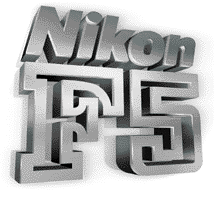 |
| Message Board | for Nikon F5 Series SLR model(s) | |
HOME - Photography in Malaysia |
![]()
A resource dedicated to my kids, Alvin Foo & Esther Foo- one day,
BOTH might need to use all these information for his/her Nikon F5A camera.
Volunteered Maintainer(s) for the Nikon F5 Message Board: Tony Davies-Patrick, UK; Rick Oleson, US; Koh Kho King, Malaysia.
Credit: Mr. Chuck Hester, US for his text re-editing skill for this site; Our staff, HowKiat® who created the 3D-Nikon F5 logo. Mr. Lew Chee Wai of YL camera for lending his F5 for me to take some shots appeared in this site. All those nice folks who have contributed their images, in particular Mr. Mike Long, Edwin leong, Palmi Einarsson, Sergio Pessolano, Fred Kamphues, Harry Eggens, Curtis Forrester, Nick (Natures Moments), Sandra Bartocha; fellow countrymen, Vincent Thian, Koh Kho King, Philip Chong, CY Leow etc. and contributions from a few nice folks from Photo Malaysia Forum. Disclaimers & acknowledgments: Certain content and images appeared in this site were either scanned from official marketing leaflets, brochures published by Nikon and/or contribution from surfers who claimed originality of their own work for public publishing in this website, where majority of the extracted information are used basing on educational merits. The creator of this site will not be responsible for any discrepancies that may arise from any possible dispute except rectifying them after verification from respective source. Neither Nikon or its associates has granted any permission(s) in using their public information nor has any interest in the creation of this site. "Nikon", "Nikkormat", "Nippon Kokagu KK" "Silent Wave", "Focus Tracking Lock-on", "Nikkor" & other applicable technical/business terms are registered trade name(s) of Nikon Corporation Inc., Japan. Site made with an Apple G5 IMac.